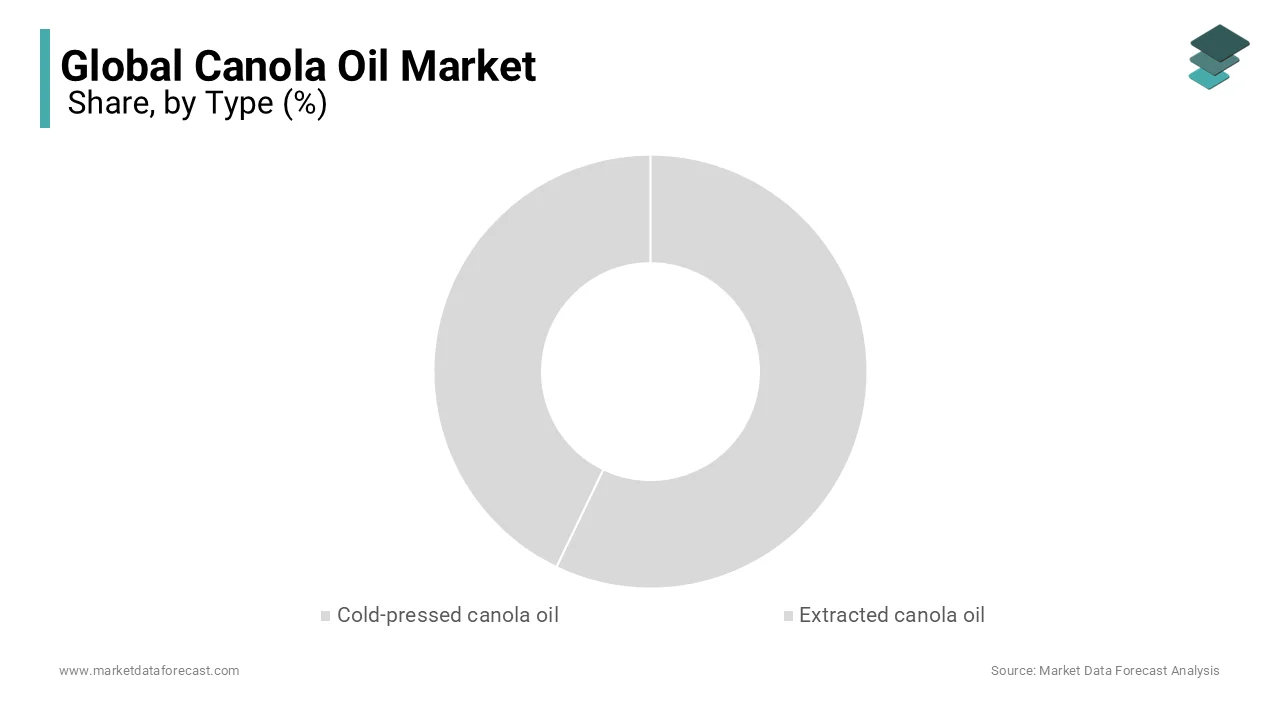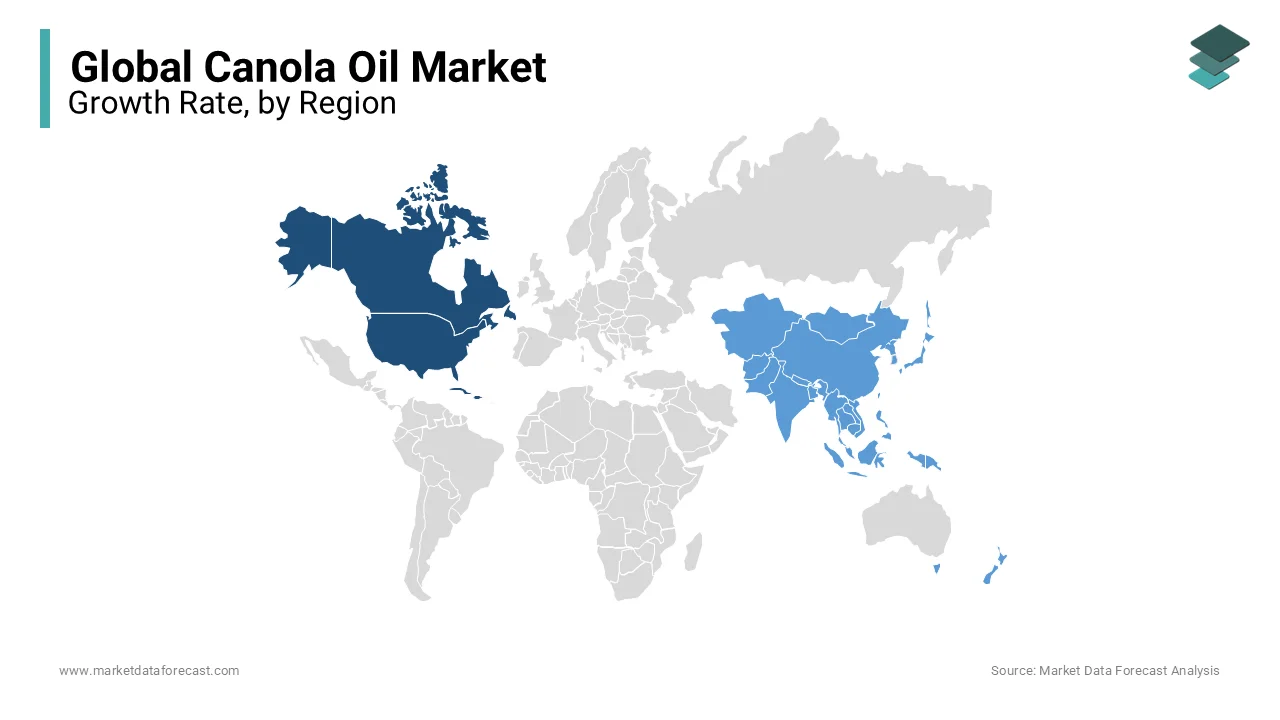Global Canola Oil Market Size, Share, Trends & Growth Forecast Report - Segmented By Product Type (Extracted, Cold-Pressed), Application (Oleo Chemicals, Biofuels, Food Industry), And Region(North America, Europe, Apac, Latin America, Middle East And Africa) - Industry Analysis 2025 to 2033
Global Canola Oil Market Size
The Global Canola Oil Market size was valued at USD 35.83 million in 2024 and is estimated to reach USD 60.53 million by 2033 from USD 37.98 million in 2025, with a CAGR of 6.0%.

Canola Oil Market is experiencing an increase in growth due to the increasing demand for canola oil due to its high nutrient content. Canola oil comprises a different fatty acid profile with low levels of saturated fatty acids, more monounsaturated fatty acids, and considerable levels of omega-3 and omega-6 fatty acids. Canola (Brassica napus) is one of the top five oilseed crops grown worldwide and the leading oilseed crop in Canada. Canola oil is experiencing strong growth in the Canola Oil Market due to its high nutritional value and flavor. The consumption of canola oil promotes good heart health, thanks to its fatty acids. Therefore, due to this critical aspect, most consumers around the world prefer canola oil in their daily use. Canola oil contains 7% saturated fat, which helps lower cholesterol in the human body. The global canola market is booming as it is a rich source of vitamin E, acting as an antioxidant that can protect the fat in the human body and proteins from free radicals. Taking all these factors into account, canola has become one of the world's essential oil crops. Canola oil is the third largest vegetable oil after palm and soybean oil in terms of volume.
MARKET DRIVERS
The growing awareness of the health benefits of consuming canola oil and the increasing adaptation to a healthy lifestyle are the main factors driving the growth of the global canola oil market. Another factor driving the market growth is the growing demand for canola oil in the food industry.
The increasing use of canola oil in the cosmetic industry for skin and hair care products and the expansion of the retail sector is also expected to support this business growth. The increasing use of canola oil in the chemical industry and for biofuels are additional factors that are expected to drive global canola oil market growth. However, the high prices associated with canola oil and its adverse effects on the liver and kidneys are considered as the principal factors supposed to restrict the growth of the global canola oil market in the future. Profitable development of canola oil and promotional activities that use social platforms to increase awareness of the health benefits of canola oil among people in developing countries can create high-income opportunities for business players
MARKET RESTRAINTS
An increase in cardiovascular disease cases has led to a large part of the population to focus on their health. Since canola oil is high in oleic acid, which helps reduce harmful cholesterol levels in the body, health-conscious consumers are increasingly using it as cooking oil. , thus stimulating the growth of the market. Due to the many benefits of canola oil, its demand is now increasing for stir-fries, grills, cakes, stir-fries, and as a salad dressing. A hectic lifestyle combined with high levels of consumer income has led to the tendency to eat out, which has spurred demand for canola oil in many restaurants. Canola oil is used in the cosmetic and skincare industries due to its anti-aging properties that help reduce acne, fine lines, wrinkles, and blemishes. In addition to that, it is also used in the haircare sector, as canola oil helps to straighten hair. Additionally, canola oil is used in the preparation of plasticizers to provide increased speed. The growth of these end-use industries creates new positive prospects for the global canola oil market. The residues obtained after the production of canola oil are used for livestock because they include a significant amount of amino acids and a low number of glucosinolates that help provide vitamins, minerals, and fiber to livestock. After soybean, canola meal is considered the second most crucial food meal in the world. Canola oil prices are comparatively higher than other edible oils available on the market, limiting its widespread adoption. However, the readily available substitute, soy, limits growth in the global canola oil market.
REPORT COVERAGE
|
REPORT METRIC |
DETAILS |
|
Market Size Available |
2023 to 2033 |
|
Base Year |
2024 |
|
Forecast Period |
024 to 2035 |
|
CAGR |
6.0% |
|
Segments Covered |
By Type, Application And Region |
|
Various Analyses Covered |
Global, Regional and Country Level Analysis; Segment-Level Analysis; DROC; PESTLE Analysis; Porter’s Five Forces Analysis; Competitive Landscape; Analyst Overview of Investment Opportunities |
|
Regions Covered |
North America, Europe, APAC, Latin America, Middle East & Africa |
|
Market Leaders Profiled |
Archer Daniel Midland Company, Associated British Foods, Burge, Cargill, Wilmar International, Conagra Foodservice, Dalmia Shop, Huiles TITAN OILS, Jivo Wellness, Richardson International |
SEGMENTAL ANALYSIS
By Type Insights

Cold-pressed canola oil is high in omega-three, which can help reduce the risk of heart disease, as well as linoleic acid. Omega-6s help promotes brain health. Cold-pressed canola oil is the safest type for cooking. Four health benefits of cold-pressed oil are low in saturated fat, balance omega three and omega four, contain vitamin E and natural plant sterols. Canola oil is produced in a processing facility by heating it slightly and then crushing the seeds.
By Application Insights
Most of the people used canola oil for cooking in their area. The use of canola oil is huge compared to biofuels and oleochemicals. Canola oil is used in the food industry in various foods such as margarine, salad dressings, coffee whiteners, cake mixes, fried snacks, shortening, cookies, cooking sprays, creams, bread, etc. Canola oil is also used in inedible areas as biofuels and oleochemicals. It is also used in biofuels such as biodiesel, bioplastics, etc. Canola is generally the perfect oil for making biodiesel because it remains liquid at low temperatures and has a high energy content. Oleochemicals are chemical compounds industrially derived from animal or vegetable oils or fats. Canola oil is also used to make oleochemicals.
REGIONAL ANALYSIS

North America leads the global Canola Oil Market and is expected to remain dominant towards the end of the forecast period. Canada, the world's largest producer of canola oil, is expected to contribute significantly to the growth of the region's canola oil market. In two thousand fourteen, the world production of canola oil was twenty-six million tons, led by China, Germany, and Canada as the leading producers that together represent forty-seven percent of the world total. Canada was the world's largest exporter of canola oil in 2000, exporting two point nine million tons, or approximately ninety-four percent of its total production. Europe has massively spent on infrastructure to use canola oil for biodiesel, fueled by EU policy initiatives on biodiesel. The Asia Pacific region is also estimated to register a notable growth rate in the foreseen years because of the increasing investments in emerging economies like China, Japan, India, etc.
KEY PLAYERS IN THE CANOLA OIL MARKET
Key Players in canola oil market are Archer Daniel Midland Company, Associated British Foods, Burge, Cargill, Wilmar International, Conagra Foodservice, Dalmia Shop, Huiles TITAN OILS, Jivo Wellness, Richardson International
RECENT HAPPENINGS IN MARKET
- Richardson International has signed an agreement with Conagra Brands to purchase its Wesson line of canola and vegetable cooking oils. The agreement also includes Wesson's production facilities in Memphis, Tennessee. This 280,000-square-foot manufacturing facility will complement Richardson's food and ingredients division. Wesson's offering comprises vegetable oil, canola oil, corn oil, and blended oils.
- According to FarmLink, China has found a way to get the Canadian vegetable oil it needs after avoiding direct imports from the country earlier this year. Canadian Grain Commission data for September shows that canola exports to the United Arab Emirates increased 533% from last year to 93,100 tonnes. Canadian canola is crushed, then oil is exported to China.
- The Federal Trade Commission filed an administrative complaint alleging that JM Smucker Co.'s proposed acquisition of $ 285 million of Wesson's cooking oil brand from Conagra Brands, Inc. "is likely to" significantly reduce competition or create a monopoly. 'In violation of the Clayton Law; "and thus reduce competition in the United States for vegetable and canola oils. Smucker currently owns the Crisco brand and, by acquiring the Wesson brand, would control at least 70% of the market for branded canola and vegetable oils sold to grocery stores and other retailers.
- Cargill announced the signing of an agreement with Dalmia Continental Pvt. Ltd (DCPL) for the acquisition of its Leonardo olive oil segment. Leonardo is the renowned brand in the olive oil segment and also a pioneer in establishing and improving the use of olive oil in India. Cargill Inc. has a strong presence in the olive oil segment across the globe, and this acquisition will create a unique opportunity for this enterprise.
MARKET SEGMENTATION
This research report on the global canola oil market has been segmented and sub-segmented based on Type, Application, & region.
By Type
- Cold-pressed canola oil
- Extracted canola oil
By Application
- Biofuels
- Petroleum chemicals
By Region
- North America
- Latin America
- Europe
- Asia Pacific
- Latin America
- Middle East & Africa
Frequently Asked Questions
1.What is canola oil?
Canola oil is a vegetable oil derived from the seeds of the canola plant, primarily grown in regions with temperate climates. It is known for its neutral flavor, high smoke point, and heart-healthy profile
2.What are the health benefits of canola oil?
Canola oil is low in saturated fat and high in unsaturated fats, including monounsaturated and polyunsaturated fats. It also contains omega-3 and omega-6 fatty acids, which are beneficial for heart health. Additionally, canola oil is free from trans fats and cholesterol.
3.What are the culinary uses of canola oil?
Canola oil is versatile and can be used for various cooking methods, including frying, baking, sautéing, and salad dressings. Its neutral flavor makes it suitable for both sweet and savory dishes.
Related Reports
Access the study in MULTIPLE FORMATS
Purchase options starting from $ 2500
Didn’t find what you’re looking for?
TALK TO OUR ANALYST TEAM
Need something within your budget?
NO WORRIES! WE GOT YOU COVERED!
Call us on: +1 888 702 9696 (U.S Toll Free)
Write to us: [email protected]